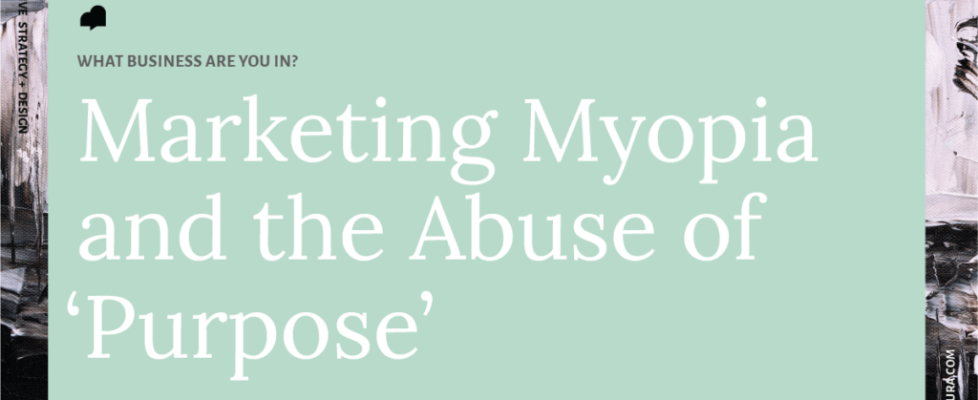Marketing Myopia and the Abuse of Purpose
Framing Lessons from Patagonia and some caution about jumping on the brand purpose bandwagon
Recently, there has been a lot of attention given to the decision of Patagonia’s founder’s to give away his company to a trust that will ensure profits go towards fighting climate crisis saying: “Instead of ‘going public,’ you could say we’re ‘going purpose.’ In the sea of commentary and declarations about how inspiring this action was — and let’s be clear, it was — there was something notably missing from the discussion. It was just as unsurprising as it is uncommon, and we should be talking about how it can be both things simultaneously because, for brands, that gap represents the divide between success and greatness.
But what I’d like to avoid is putting the brand purpose movement of today on a pedestal. Because to be honest, the sort of hyperbole you see from ‘purpose led brands’ like WeWork, claiming to ‘elevate consciousness’, and ‘build a world where no one feels alone is just as confusing and shocking coming from a company that rents office space, as is the fact that Patagonia’s donation both meets expectations and defies convention. Some aspirational purpose statement that brands spend their energy trying to live up to isn’t what makes Patagonia great whether Chouinard calls his behavior purpose-driven or not. It comes down to what the brand really is at the core of its identity, and this is something brands are more and more struggling with.
There is an identity crisis at hand for the brands of today that has been engineered by designers, strategists, and marketers over the last 70 years. And while some are blameless, most of us suffer from not going far enough. From settling for half measures. And importantly, most of us have failed to shake ourselves free from outdated modes of thinking like demand generation, gaining market share, and creating equity—all of which encourage us to narrow our frame and overlook possibilities. And now, we’ve painted ourselves into neat little lanes and are attempting to post-hoc layer in the meaning that people are rightfully missing. Some brilliant designers, marketers, and strategists find success. Dove for instance, now empowers and encourages body positivity. But most fail in this approach, as evidenced by the fact that most of Dove’s traditional competitors just sell soap. We need to think bigger than asking what is the reason we sell the products we sell. We need to ask what it is about us that led us to sell the products we sell. And what else might that personal insight lead us to do beyond selling that widget.
Whether instinctively or deliberately, Patagonia does this, and that is what sets them up for greatness. Disney does it too. And there are others. You know them. They are the brands that people love the most. The ones that are referenced again and again—because they are in the business of competing not for a share of basket or share of market but competing for share of life. They strive to be valuable in an aspirational world that they can envision, and once people come to see that world too, they become reluctant to settle for less. And that vision isn’t bound by categories or conventions or individual competitive markets.
Patagonia, Disney, Nike, Apple— all these brands at some point made a conscious choice—they chose to compete for share of life, not share of some market defined by transactions. And that deliberate choice reflects how they will define and interact with the space they choose to operate within as opposed to reacting to the pressures of a market. Patagonia doesn’t sell apparel and outdoor gear any more than Apple sells consumer electronics. Patagonia helps people experience nature’s majesty. Apple is in the business of sharing sacred knowledge. Disney captivates with momentary suspension of disbelief. These promises, these purposes are not lofty trash. They are critical, basic desires that transcend categories. The need to witness the inspirational, the seeking of elevation and betterment, the need to lose oneself in the imagination or play. You could call it purpose, but it’s not what WeWork means when they talk about purpose and naming it won’t make it easier to do the work you exist to do over a period of time.
I’d encourage brands to break away from the short-hand leading them astray. Instead of trying to ‘why’ your way to some insight about your reason for being, ask what business am I in? That will tell you a lot about your long-term survivability and if you’ll hope for success or aim for greatness. The North Face is in the apparel business—Patagonia is in the wonderous nature business. Netflix is in the streaming business while Disney is in the magical entertainment business. Samsung is in the electronics business and Apple is in the technological lifestyle business. It may seem like a minor distinction, but the widening aperture that those framings offer makes all the difference.

